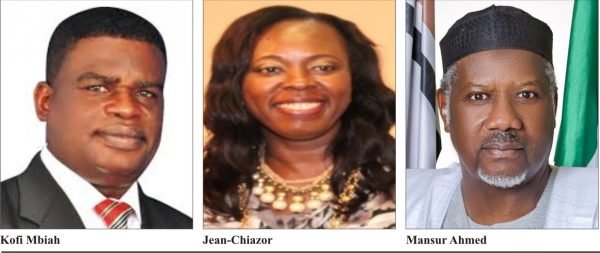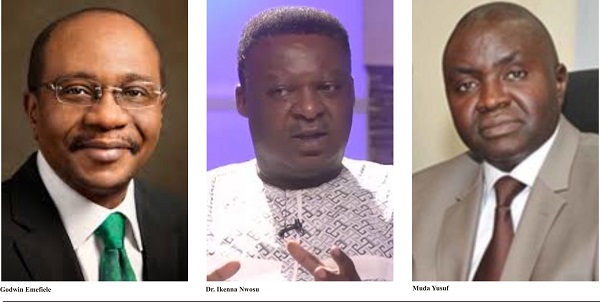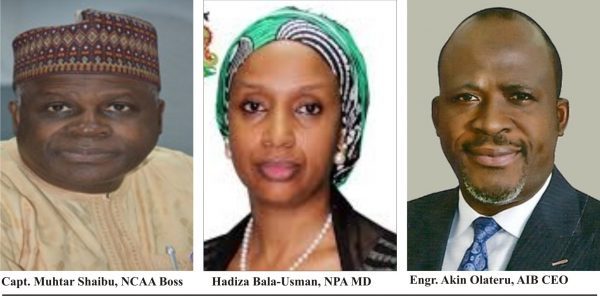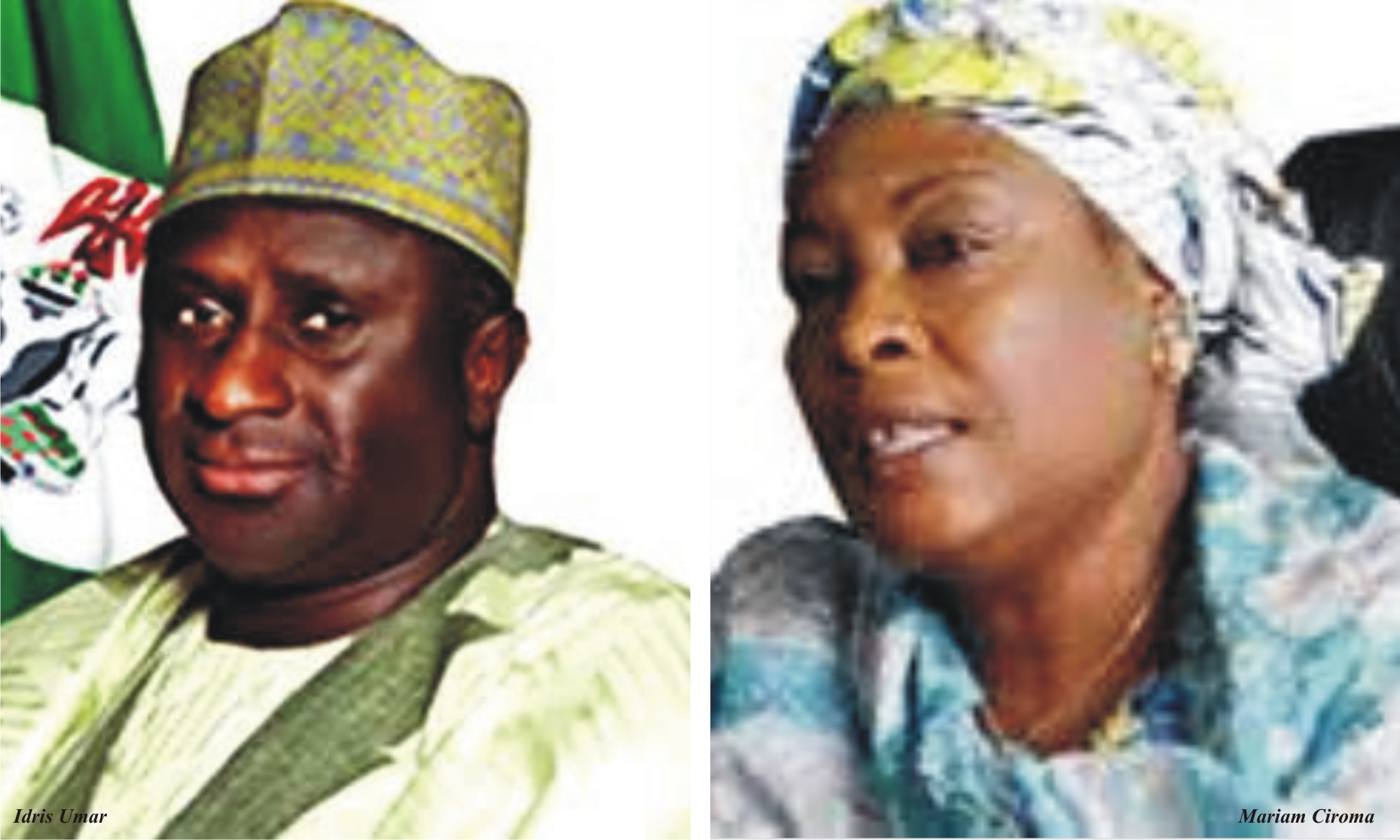PERISCOPE
Half Year Report: How NIMASA, Customs, NCAA, NRC Fared
By Kenneth Jukpor & Oyeniyi Iwakun
While the Federal Government is still grappling with the implementation of 2018 budget just passed in July without regard to its consequences to the economy, the transport being derived demand driven is faced too many chaos. Parastatals in the sector are still battling with sectoral budgetary issues without specific time for the passage or clearance to allow for efficient planning and implementation. The agencies have been crippled by the financial constraints with indebtedness even on the most negligible amount of money; nevertheless, MMS Plus brings you an assessment of the major parastatals in the transport sector for the first half of the year.
For the grading system: A =90-100%, B+ = 80-89%, B =70-79%, C+ =60-69%, C =50-59%, D =40-49% and E = 30-39%, F = 0-30%. Enjoy it:
Nigerian Maritime Administration and Safety Agency (NIMASA)
NIMASA is the agency saddled with the onus of maritime administration and safety; to pursue the development of shipping and regulatory matters relating to merchant shipping and seafaring.
The Director General of the agency, Dr. Dakuku Peterside set the pace in February with the launch of ‘2018 Nigerian Maritime Forecast’ to provide a guide to investment in the sector for 2018 and 2019; but how did NIMASA fare in the first half of 2018? How has the NIMASA boss managed his political ambitions vis-à-vis the administration of NIMASA? To ascertain this, we look at NIMASA’s core functions unbundled into ten (10) parts each carries 10 points:
Administration and regulation of shipping licences:
NIMASA inaugurated a Maritime Committee on Nigerian Ship Register during the launch of the ‘2018 Nigerian Maritime Forecast’. The committee is saddled with the responsibility of ensuring that a review is done in ship registration process to ensure that it becomes more attractive to businesses, projects Nigeria’s image positively and ensure that it contributes positively to the nation’s economy. The committee headed by Engr. Emmanuel Ilori, is yet to disclose its findings.
Score = 5/10
Administration, Regulation and Certification of Seafarers:
This is a complicated issue. Lack of Nigerian owned/ flagged vessels means no opportunities for seafarers to obtain the requisite seatime and become employable seafarers. Therefore, the agency had little to do in this regard. NIMASA has sent cadets all around the world for seatime and its performance of this function is expected to improve in later in 2018, if the Maritime Development Bank bill is passed and the institution established to provide the much needed shipping funds however, SENATE has gone on a long vacation.
Score = 2/10
Establishment of Maritime Training and Safety Standards/ Regulation of safety of shipping as regards the construction of ships and navigation:
The truth is there are no competent officers to play this role so it has not been attended to in the first half of 2018.
Score = 0/10
Maritime Search and Rescue Services and Providing direction to ensure compliance with vessels security measures:
Search and rescue operations in the country is yet to improve; while the equipment acquired for billions of naira are abandoned at the NIMASA Research Institute, at Kirikiri, boat capsize have become the order of the day, with two mishaps recorded in Lagos last week.
Score = 2/10
Provide Maritime Security:
NIMASA and Navy but in a lot in 2017 to guarantee modest improvement but the 2018 first half report show retrogression. Piracy attacks have increased especially at the eastern ports while the NIMASA helmsman has been more focused on politicking in Abuja and Port Harcourt for a better part of the year.
Score = 2/10
Enhance and administer the provision of Cabotage Act 2003/ Control and prevent Maritime Pollution:
NIMASA has nothing in the first to change the status-quo. Nothing significant was recorded in the area of maritime pollution.
Score = 0/10
Develop and implement policies and programs, which will facilitate the growth of local capacity in ownership, manning and construction of ships and other maritime infrastructure:
Indigenous operators continue to clamour for better opportunities via local capacity ownership, manning, construction, among others, nevertheless, no programme has been organized and no policy was organized to address this function so far in 2018.
Score = 0/10
Perform Port and Flag State duties:
This function was characterized by poor service delivery throughout the first half of 2018. Let’s hope for a change in the second half of the year.
Score = 3/10
IMO Conventions:
NIMASA reached a level where they received IMO commendations for following its conventions especially in compliance to ISPS code but the agency is yet to soar on the massive maritime advantages and cargo traffic in the nation.
Score = 7/10.
Carry out Air and Coastal Surveillance:
NIMASA performed well here but it was probably as a result of the collaboration between the agency, the Nigerian Navy and the Nigerian Airforce.
Score = 5/10
Conclusion:
With the slow pace of the nation’s budget approval, NIMASA can argue that the required funds aren’t available to tackle some core functions; however, the agency has suffered more setback as a result of the political aspiration and subsequent moves by its Director General, Dr. Dakuku Peterside. The Executive Directors have equally started campaigning for the perceived vacancy of the Director General’s office rather than focus on issues that affect the agency. NIMASA is saddled with a huge responsibility with unique challenges; but those at the helm of affairs seem to be doing little to transform the agency.
Total Score 26/100
Grade F (26%)
Nigerian Railway Corporation (NRC)
The role of railway in transportation worldwide cannot be overemphasized.
In pursuit of the Railway Revitalization Agenda, the federal government has continued to intensify efforts to ensure that the dream of establishing a railway facility that interconnects the entire nation comes to reality. However, a lot of skepticism has been raised as to the possibility of the project considering so many factors. This is not without some major breakthroughs within this period under review. The Nigeria Railway Corporation (NRC) has continued to enjoy major attention and support from the Federal Government since the recent past. Hence, the need to critically analyze what happened in the first half of 2018? MMS Plus seeks to assess NRC within the period of the first six months of the year 2018 based on five of its statutory functions with twenty marks for each.
Ensure safety of operations and maximum efficiency;
NRC did not record any major reports of train derailments but there were some accidents involving individuals walking around the rail tracks with loss of lives. No report of robbery, theft and other security breaches on the trains has been heard so far.
Score = 13/20
Manage and operate the railway for carriage of passengers and goods:
The incumbent railway management seems to be more technically sophisticated and informed about global best practices in railway management. Operation tactics have improved impressively and the railway transport mode have become more popular among Nigerians who often prefer to patronize the railway to other means of transport.
NRC recorded impressive successes in freight patronage and set back in service delivery on both freight and passengers train in this half.
According to the NRC Director, Public Relations, Mr. Mahmoud Yakubu, about four trains of 20 to 25 wagons of containers loaded are moved from Apapa to Ebutte eta Junction (EBJ) station every day. This is a new initiative aimed at decongesting the ports as a result of the ongoing Apapa port road rehabilitation. Apapa to EBJ station is over seven kilometers. For the passengers’ trains, NRC runs Kano to Lagos, weekly; Lagos to Kano weekly and Lagos to Ilorin, weekly; Offa to Kano, weekly; Kano to Offa, weekly; Aba to Port Harcourt, Daily; Minna to Kaduna thrice a week, Mondays, Thursdays and Sundays and others and they are all functional trains.
NRC also services Lagos and Ogun states excluding Sundays, either from Apapa to Ijokku, to Kajola and to Iddo, Ijoko and Kajola with about six trains, three returns on daily basis and it is relatively cheap. One would realize that every day, many people travel from Ijoko to Lagos Island and Mainland to work.
The NRC management has been providing technical and professional support to other stakeholders by ensuring that no stone is left unturned. However, there is still the challenge of inefficiency with the narrow gauge because of the conditions of the tracks as confirmed by the transport minister.
Despite impressively helping in the decongestion of the Apapa environment from the gridlock with the Lagos district’s commencement of a shuttle service between Apapa and Alago meji since 2017 in the face of the ongoing road construction, there were reports of poor attention to customers’ welfare which affected their service delivery. For instance, there were reports around February by some aggrieved customers who took their wards on excursion at the Lagos District that the locomotives developed faults while the innocent children scattered all over the places were left stranded for hours. According to them, NRC neither refunded their money nor compensated them. There were other few similar reports.
There are still shortcomings in terms of the movement of petroleum products as MMS Plus suspects a substantial lack of confidence by oil marketers in the deal even as NRC announced plans to begin such services earlier in June with the forty tank wagons that had been underutilized ever since its purchase in 2012.
Based on this NRC scores 9/20
Meet cost of operation; improve market share and quality of services;
There was renewed vigor by the NRC management to ensure improvement in the quality of services to their customers, most especially the freight owners.
Revenue generation is still tasking for NRC as it still finds it very hard to raise enough funds to meet its cost of operation thereby leaving it to the mercy of the Federal Government for bulk of its finances including the payment of workers’ salaries and other related expenses. This is a major burden on the government who still injects billions of naira into the sector without expected return.
New trains and locomotives were commissioned by the president, President Muhammadu Buhari at the Abuja-Kaduna station early in the year to meet up with demands at the stations. The president also recently commissioned the Abuja light train. Although, there was a relative increase in the fare at the Abuja station but, the Director, Operations, Mr. Niyi Alli justified the decision when quizzed by MMS Plus that the quality of services enjoyed by passengers at the station is commeasurable with the fare. The Abuja-Kaduna train was of qualitative services coupled with other customers’ service innovations.
Score = 6/20
Direct and control of any expansion or extension of the railway and the construction of new railway:
The Buhari’s Administration has set three major standard gauge rail lines for completion before the end of their tenure. These rail lines; Lagos-Kano, Lagos-Calabar, Port Harcourt- Maiduguri is estimated to cost $46 million according to the Minister for Transportation, Rt. Hon Rotimi Amaechi and the project is expected to be executed in partnership with China Civil Engineering Construction Company (CCECC) and other investors who key into the project in the nearest future.
Similarly, the Narrow gauge which is about 3,505 is proposed for concession to an American consortium, General Electric (GE) who would rehabilitate, manage and operate it for some number of years.
Again, the Lagos-Ibadan segment of the Lagos-Kano standard gauge was projected to be completed, commissioned and used by December, 2018 while the Warri-Itakpe line was given June, 2018 timeline for completion according to the Nigerian transportation minister. Meanwhile there are doubts as to meeting up with the said timeline for completion due to so many factors.
Amaechi identified some challenges that have been slowing down work progress in the past. These ranges from challenges of utilities; water pipes, NNPC pipes carrying crudes and gas and petroleum on the right of way especially in Lagos heading towards the Apapa Seaport which may alter December, 2018, timeline set for getting the job completed as earlier stipulated even as he assured that federal government would still stick to the timeline.
Nonetheless, the track laying for the Lagos –Ibadan segment had begun as at April, 2018 and it is expected to gather more momentum in months to come. Two track laying machines as at the time of visit by MMS Plus and each is expected to lay 1.4kms per day with a lot of other equipments are already on site and hundreds of workers were seen at work.
The standard gauge from Itakpe in Kogi state through Ajaokuta, up to Warri in Delta state abandoned for over twenty years is currently under rehabilitation. According Mr. Mahmoud Yakubu, the coaches to be used on that standard gauge are already in the country and they have been conveyed by road to Warri.
Amaechi clarified recently that, although there are also internal challenges confronting the project but he only promised a timeline of May, June and August for the project’s completion even as he assured that all other things was going smoothly and the project would be ready by August.
Score = 8/20
Meet social responsibility in a manner that will meet the requirements of rail users, trade, commerce, industry and general public:
NRC cannot still meet the requirements of rail users, trade, commerce, and others. This is because of capacity constraints and neglect by government in the past and the existing railway act which is preventing the input of private investors.
There are still delays and non-adherence to time schedules without explanations in railway services in Nigeria especially in Lagos.
The DMU which is the standard coach and locomotive is still not affordable to the common man. There are some interventions and dispositions to corporate social responsibilities by NRC in the first half of the year.
Score = 6/20
Conclusion
The comfort that comes with modern train facilities is enough justification for the rare patience and understanding that Nigerians have given those at the helm of affairs who promised to deliver this project in no distant time.
The additional Diesel Multiple Units (DMU) locomotives and other modern facilities newly commissioned at the Kaduna-Abuja station and Abuja light train compliments government’s commitments to the railway revitalization project.
Government is expected to address the issues of low capacity and poor customers’ welfare which has constituted a major setback in the sector. The demands for both passengers and freight services are still beyond the delivery of NRC.
Despite assurances and the signing of Bilateral Agreements, Memorandum of Understanding (MoUs) by the Federal Government with General Electric, the concession idea still appears utopian as no visible progress is seen.
Nonetheless, the railway transport system is still popular because of its promising qualities. The Nigerian Railway, having completed its phases of rehabilitation of its vast assets, is still expected to play an increasingly pivotal role in the economic and social developments of the country in the second half of 2018.
Grade E (42%)
Nigerian Civil Aviation Authority (NCAA)
Nigerian Civil Aviation Authority (NCAA) would be assessed based on five cores responsibilities with each function carrying 20points.
NCAA performed fairly in the aspect of regulating the safety of aircraft operations, air navigation and aerodrome operations, in the first half of 2018. Although the global aviation industry witnessed several incidences and accidents but none resorted into any fatality or any serious injury in Nigeria even as NCAA assured that the regulatory agency would sustain and improve on the safety level in the past years while the safety recommendations of Accident Investigation Bureau (AIB) would be followed to the letter in order to improve safety in the system.
Score: 8/20
Monitoring aircraft operating environment for safety and security
Although there were reports of repeated burglaries and theft in the Lagos airport early in the year but NCAA seem to have put some machineries in place to checkmate such incident. NCAA intensified surveillance via checking, rechecking, training, retraining, and inspections as much as possible to avoid recurrence of whatever happens is in the past on the operating airlines in the country following incidents that occurred in the nation’s aviation industry in the first half of 2018.
NCAA should continue to adhere strictly to the eight critical elements of the International Civil Aviation Organization (ICAO) in order to prevent an accident from happening in the system, in its bid to consistently carry out safety oversight functions of operating airlines in the country.
Score: 11/20
In the performance of the responsibility of regulating methods of entry and conduct of air transport business: NCAA insisted that no matter the current safety level, it would not rest on its oars, but would continue to beam its searchlight on all operators in order to prevent disaster. Meanwhile, there seem to be some unpopularity in the performance of this function in the real sense.
Score: 5/20
NCCA also has the key role of balancing the economic interest of operators, users of aviation services as well as the general public and the nation as a whole: One could see the arbitrary charges and obvious extortion of passengers by operators who increase their charges at will little or no regulation or check by NCAA. Only recently that the Consumer Protection Council (CPC) came to the aid of passengers that NCAA Director General picked offence and accused CPC of usurping NCAA duties.
Score: 3/20
Setting of Aviation Training Standards and approval of Training Institutions: The industry may have compromised some of these core responsibilities. The image and rating of the nation’s aviation sector cannot be said to have reached the optimal trainings and necessary standards expected from NCAA. The aviation training institutes in Nigeria are nothing to write about.
Score: 4/20
Conclusion
The industry recorded some incidences at the airside early in the year in review that could have hampered air safety. This includes the poaching of passenger luggage on light aircraft that were in motion among others. Also, with the certification of two Nigerian airports in 2017, Lagos and Abuja airports, Nigeria’s rating has improved and these airports can also serve as hubs in West and Central Africa because they are the only certified airports in the sub-regions. Much is expected in the second half of 2018.
Total score: 41/100.
Grade = D (41%)
Nigeria Customs Service (NCS)
As a major revenue base of the government, the Nigeria Customs Service is one of the most prioritized government institutions. MMS Plus seeks to rate this important agency based on its performance of four (4) among its statutory functions:
• Collection of Revenue (Import /Excise Duties & other Taxes /Levies) and Accounting for Same:
NCS experienced impressive improvement in its revenue generation in the first half of 2018. Apapa and Tin-Can Island, the two largest Customs Commands exceeded their monthly targets throughout this period.
NCS had set a revenue target of N1.3 trillion for 2018 and it appears that the service is working assiduously to meet this target. Some strategic measures were introduced by the Customs management to ease revenue collection and blockage of leakages in tandem with international best practices.
After series of trainings, various commands have deployed the Nigerian Customs Integrated System (NICIS II) and it is expected to roll out. The repair of Apapa road is expected to help NCS build on her revenue profile in the second half of the year.
NCS makes available its accrued revenue on regular basis as a sign of transparency and accountability.
Therefore, NCS may be applauded considering the prevailing circumstances surrounding the nation’s trade system, especially, with regards to Nigeria’s current trade policies targeted at growing the local economy, which when considered, could change the opinions. Score = 13/25
• Anti-Smuggling Activities:
NCS may be commended for its intensified efforts and successes in the prevention and suppression of smuggling. The Federal Operations Unit, (FOU) Zone “A”, Ikeja is at the vanguard of these operations and smugglers have received unprecedented clampdown in recent months. There has been great increase in the number of seizures and arrested smugglers.
New strategies were successfully adopted to combat the menace of smuggling with most Commands adopting the “media-Customs partnership model” with journalists where seizures and other activities are brought to the notice of the masses on regular basis.
However, despite these successes, it has been reportedly observed that Customs officers at the ports and border stations aid sharp practices and in turn alert their colleagues at other commands, most especially FOU to intercept the same consignments.
However, non-availability of functional baggage scanners still remain a major impediment to the fight against smuggling and there is need for renewed sensitization, campaigns, seminars and other programmes to increase awareness on benefits of proper and legal trade and the dangers attached with smuggling. NCS and residents of communities at the border stations need to synergize, if the desired results must be gotten.
Score = 14/25
• Trade Facilitation/ Engaging in Research, Planning and Enforcement of Fiscal Policies of Government:
Trade cannot be said to be properly facilitated within the period under review. The status quo is still maintained in terms of operational mode and things seem to still exist in form of business as usual except the recent deployment of NICIS II.
The Authorized Economy Operator (AEO) programme introduced by the service for effective trade facilitation in 2017 still remained a paper presentation ever since then without any visible implementation.
The Executive Order on 24hrs operations at the ports and other policies on ease of doing business Customs are still fictions in that, other ports users including Freight Forwarders, Clearing Agents, and Importers still operate at a tight atmosphere.
No plausible role is heard in terms of Research and Planning. The Federal Government’s ban on land importation of some goods like rice, relatively high tariffs and other exorbitant charges has also aided smuggling.
Despite high publicity on the need to patronize locally produced rice, Nigerian markets are still flooded with the foreign parboiled rice while the locally produced is still in scarcity, hence, the increase in rice smuggling activities.
Score= 3/25
• Working In Collaboration With Other Government Agencies In All Approved Ports and Border Stations:
Customs’ inter-agency collaboration with sister agencies such as the Nigeria Police Force (NPF), Standards Organization of Nigeria (SON), Nigeria Drug Law Enforcement Agency (NDLEA), National Agency for Food and Drug Administration and Control (NAFDAC), Economic and Financial Crimes Commission EFCC, the Nigerian Army in ensuring compliance, anti-smuggling and other forms of crime combats which includes illegal commercial activities and illicit trade acts is obviously acknowledged.
The anti smuggling operations may not be a success story save the roles of the Navy, Police and Civil Defense Corps. Score=15/25
Conclusion:
The performance of NCS in the first half of 2018 is impressive so far in terms of revenue collections. It should be noted that the absence of functional baggage scanners still remain a major challenge and Customs management should work on this as a matter of expediency because of its security implications to the country.
Smugglers and conniving customs officers should be publicly paraded and prosecuted when nabbed to serve as deterrence to others.
Meanwhile, the anti-smuggling unit of the service must be commended for a job well done so far, and also the introduction of new uniforms is a welcome development as it would boost the image of the service and will enhance easy identification and placement of officers.
Grade = E (45%)








